Today was a busy day of David and I trying to abuse the Nissan Murano Cross Cab that you may recall from my embarrassing attempt to do some cop hood slides. All this is to say that I ended up quite filthy and exhausted, fell asleep while planning to do Cold Start, woke up with Cold Start somehow unfinished by sleep elves, and now here we are. Luckily, I happened to notice a weird old brochure that got me thinking. Thinking about trunks. And that led me to realize something about an important car, so let’s get to it.
The brochure that started it was one for a 1950 Mercedes 170V, as you can see up there. For a 1950 car, the design is a bit archaic, which is understandable – these W136-series cars were around since 1935, so it wasn’t exactly a cutting-edge design.
But you know what? There was a cutting edge sibling to the 170V! The V there stood for vorn which means front, as in where the inline-four engine was, because there was another, less popular variant, the 170H, H for heckmotor meaning “rear-engined” and that was cutting-edge, for the time.
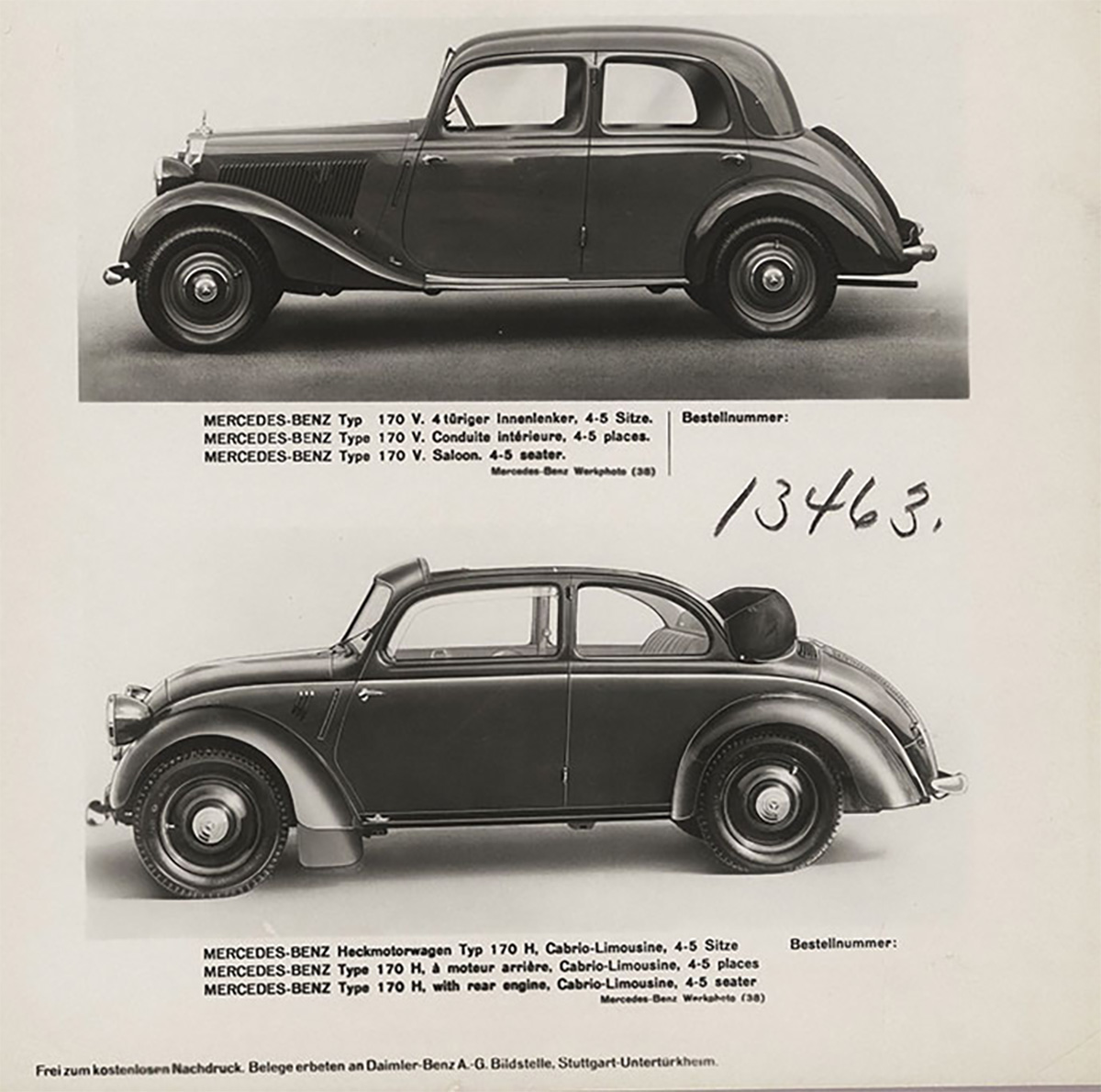
But I’m getting off-track. What I wanted to discuss about the 170V is this:
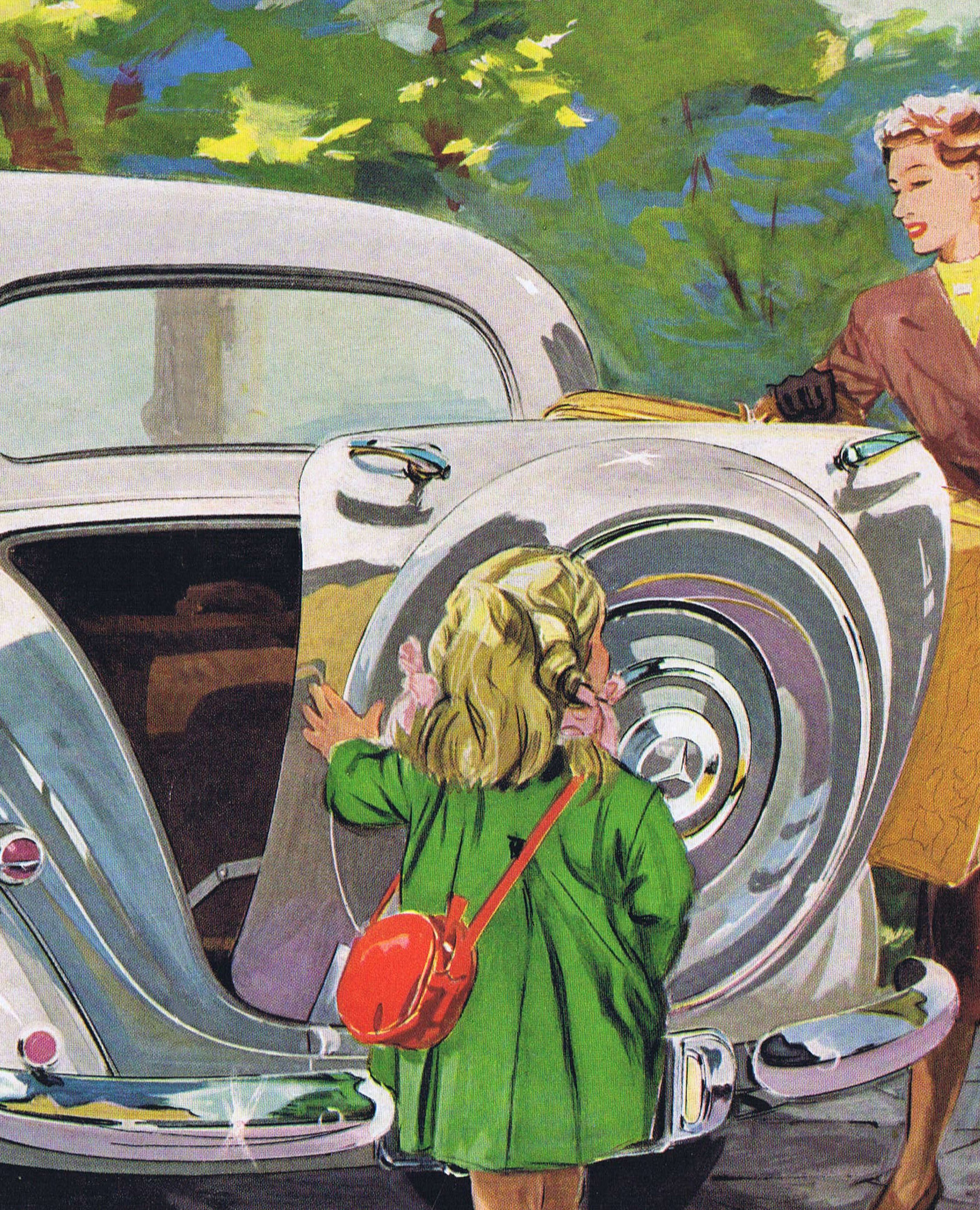
Look how that trunk opens, with the bottom hinge. It seems such an awkward and ungainly way to handle an opening trunk! and that’s about as far as it extends open:
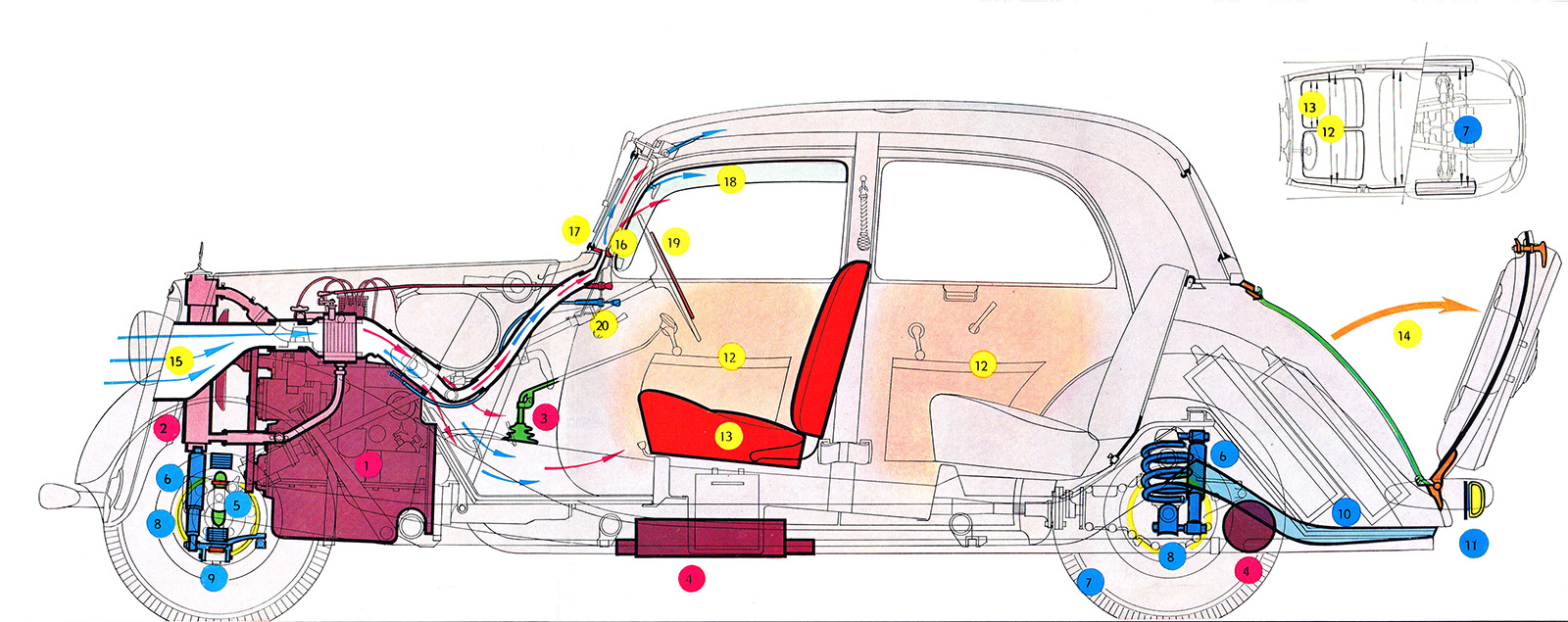
Why did trunks open like this? I really can’t think of a worse way to try and load heavy suitcases into that thing. Was it because the tire inset into the trunk lid made that lid wildly heavy? I’m not sure, but it seems awful. And this wasn’t limited to Mercedes-Benz. Look at this Citroën Traction Avant:
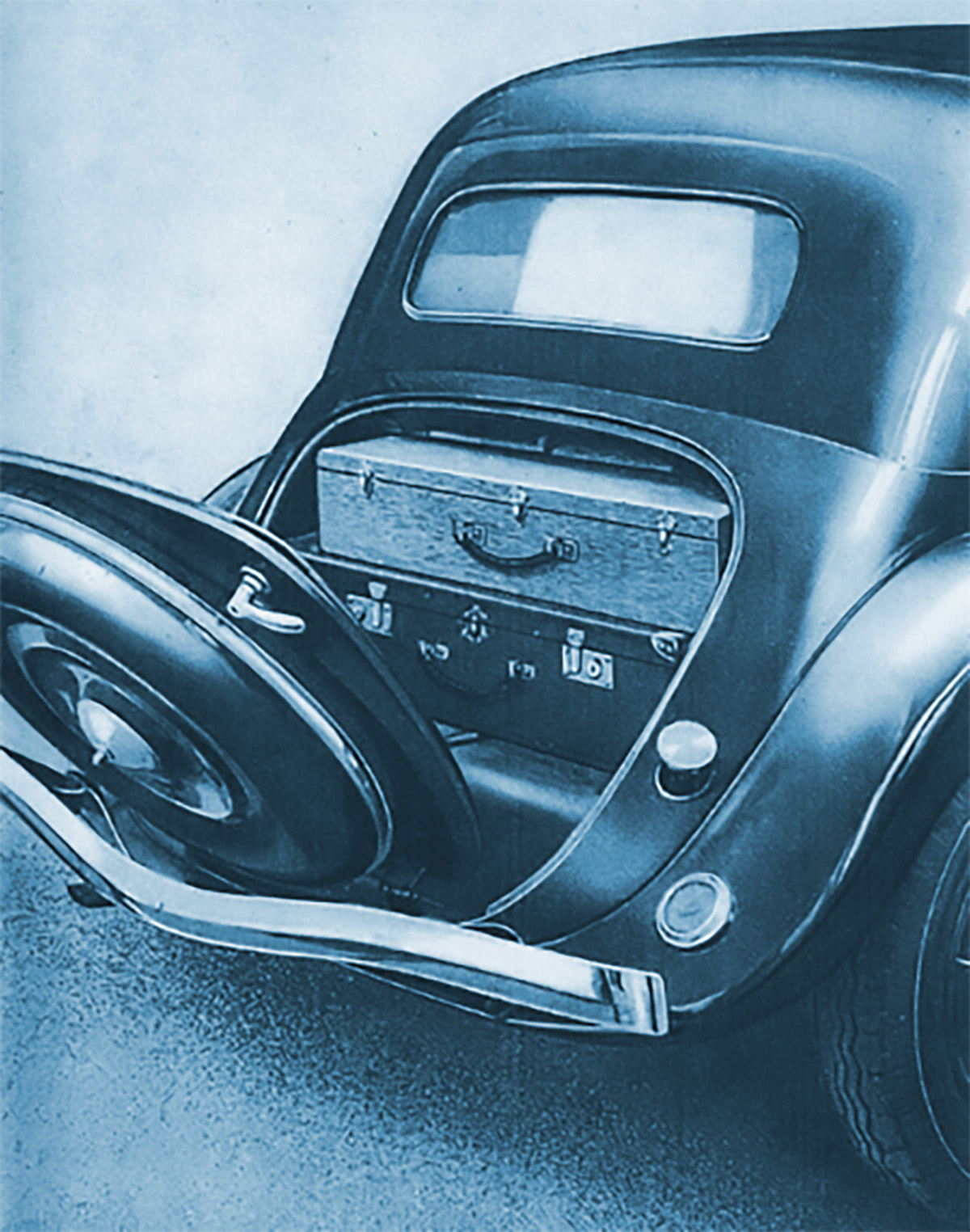
Same madness. It’d be such a pain to get those suitcases into a trunk that opened this way! Why the hell was this such a relatively common design for so long?
So my intent was to kvetch about this lousy trunk-opening method, but then I got sucked down a Traction Avant trunk rabbit hole, because this car seemed to have almost every possible method of getting luggage into the trunk that was possible with the technology of the era.
The first ones had no opening trunk, you had to load everything from the inside, folding the rear backrest, like a Henry J or something. So that’s one way. Then there’s the stupid bottom-hinged trunk we see up there, that’s another.
Then I saw one that had a top-hinged trunk, which makes much more sense:
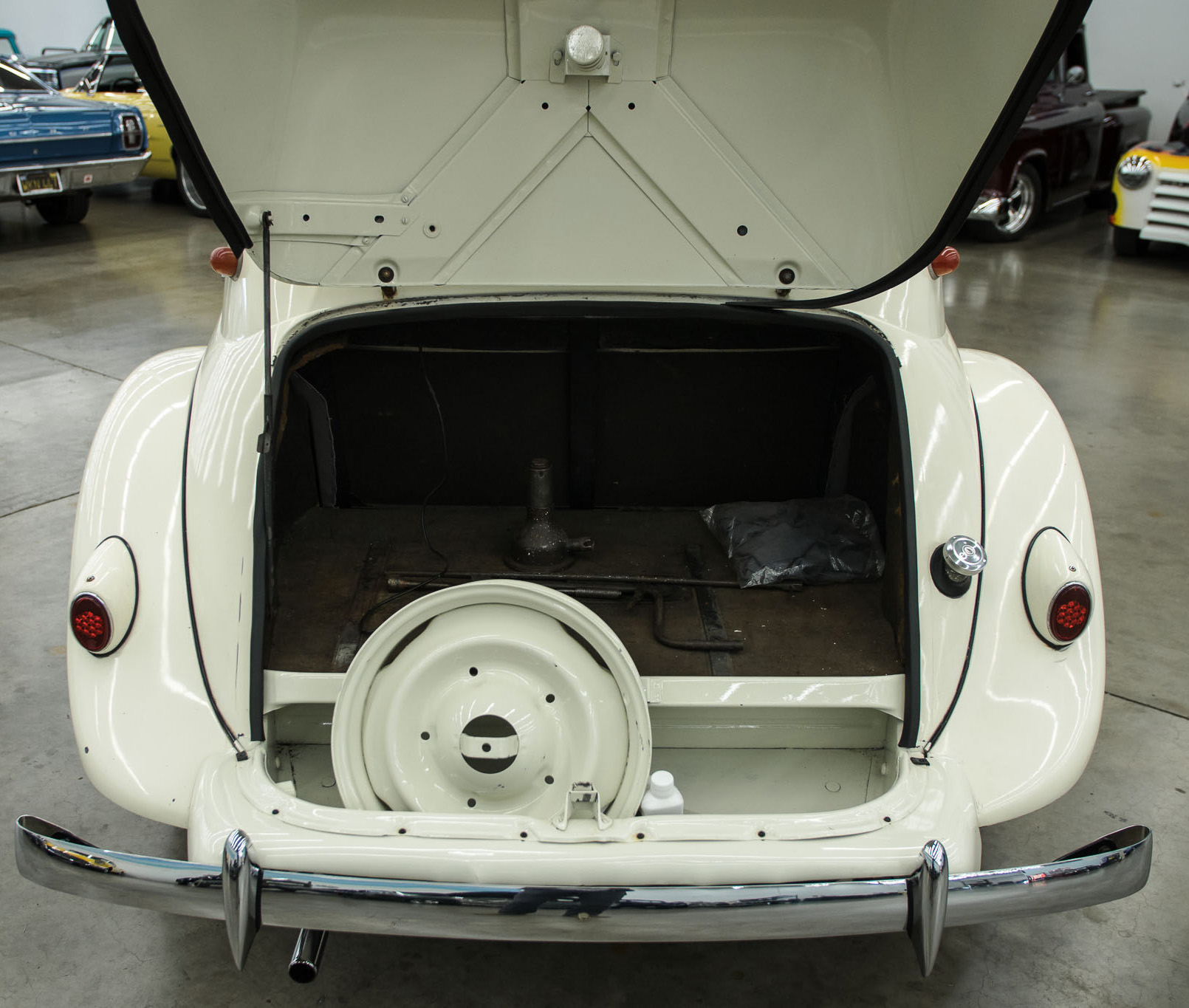
That one also has Volkswagen “snowflake” 1955-1961 taillights, so maybe there’s some shenanigans going on, but still. That top hinge seems to give much better access.
There’s more! There was an early “Commerciale” version where the rear dropped like a true tailgate and there was an upward-opening section, too!
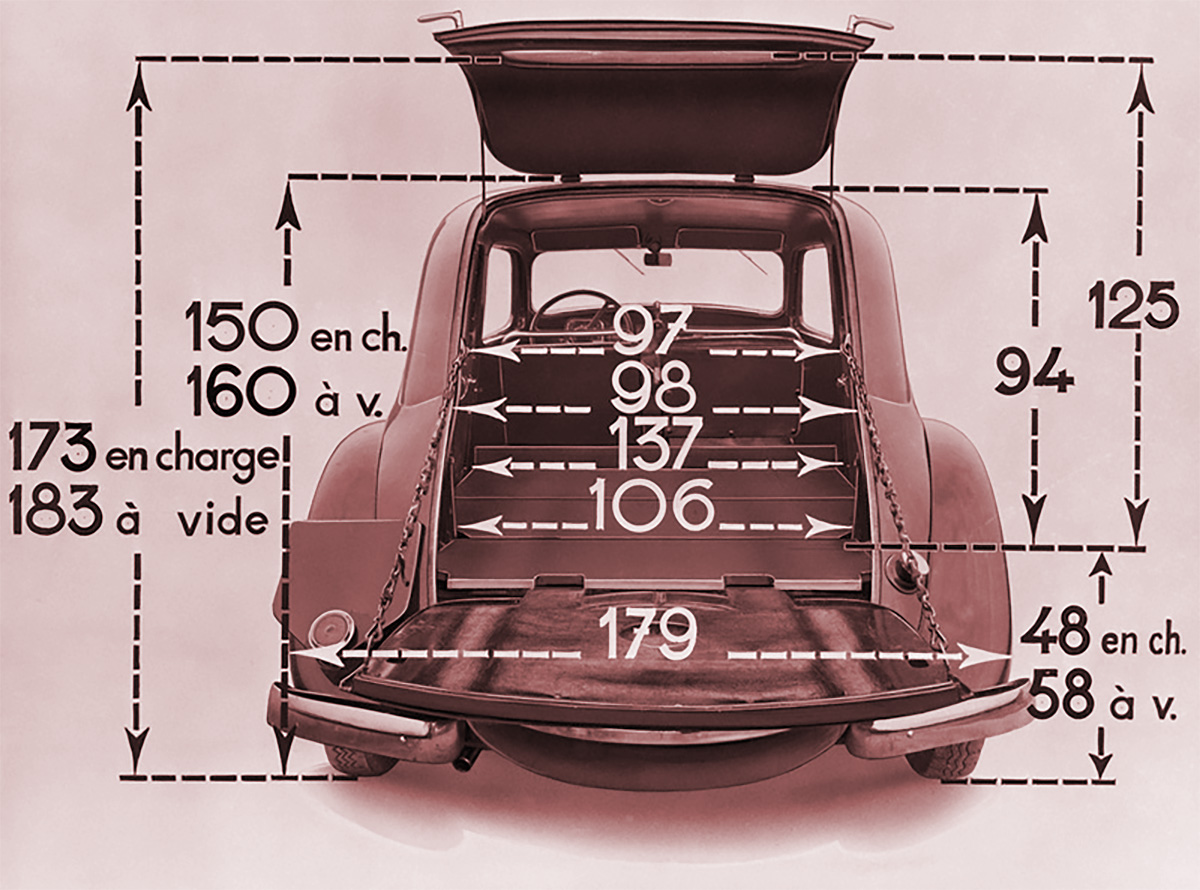
…and after that, there was another Commerciale variant that was, arguably, the first mass-market true hatchback:
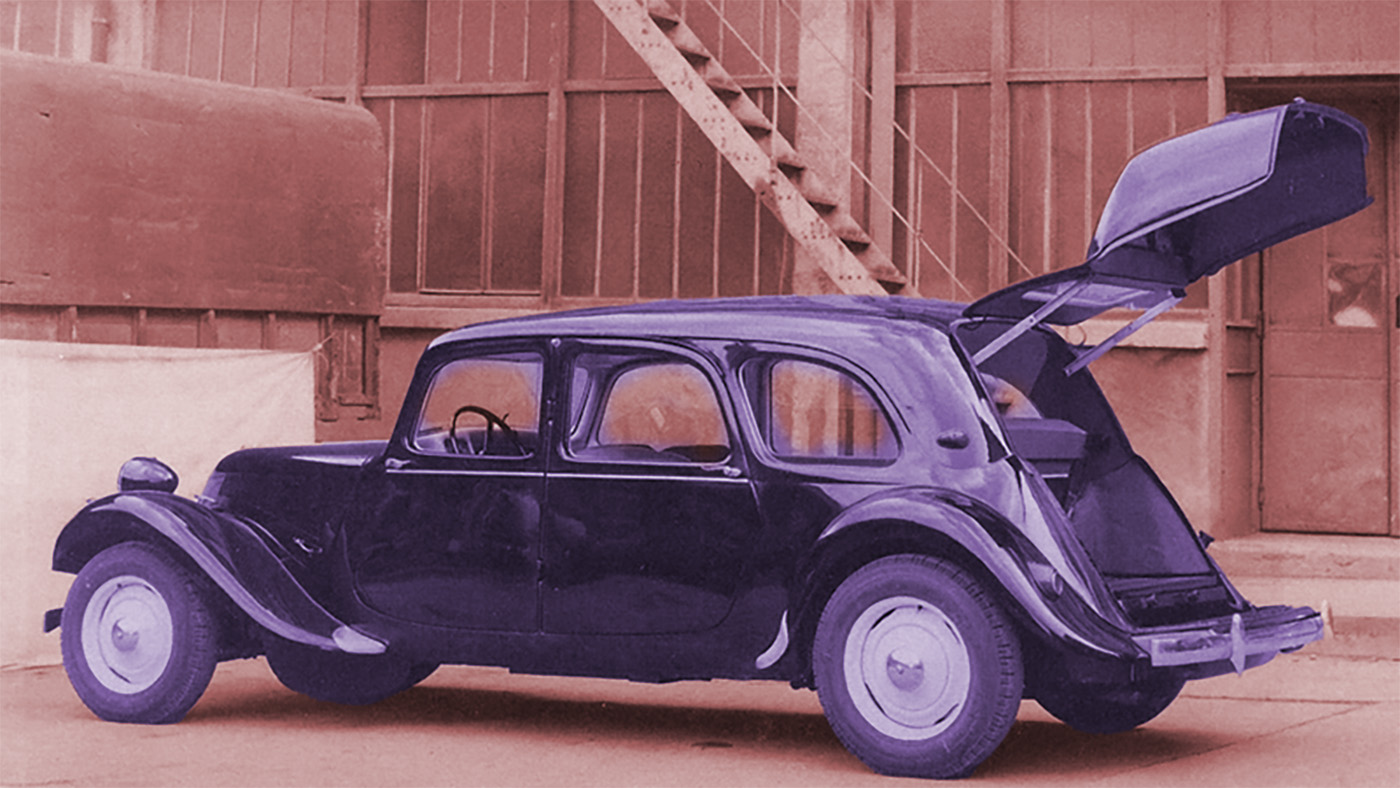
That’s a big deal in the trunk-access community! A true hatchback! But then the idea of a Traction Avant “commercial” vehicle went even further, and in 1949, the Copenhagen Citroën factory offered a Traction Avant van, with this remarkable wooden roll-up door, like a desk:
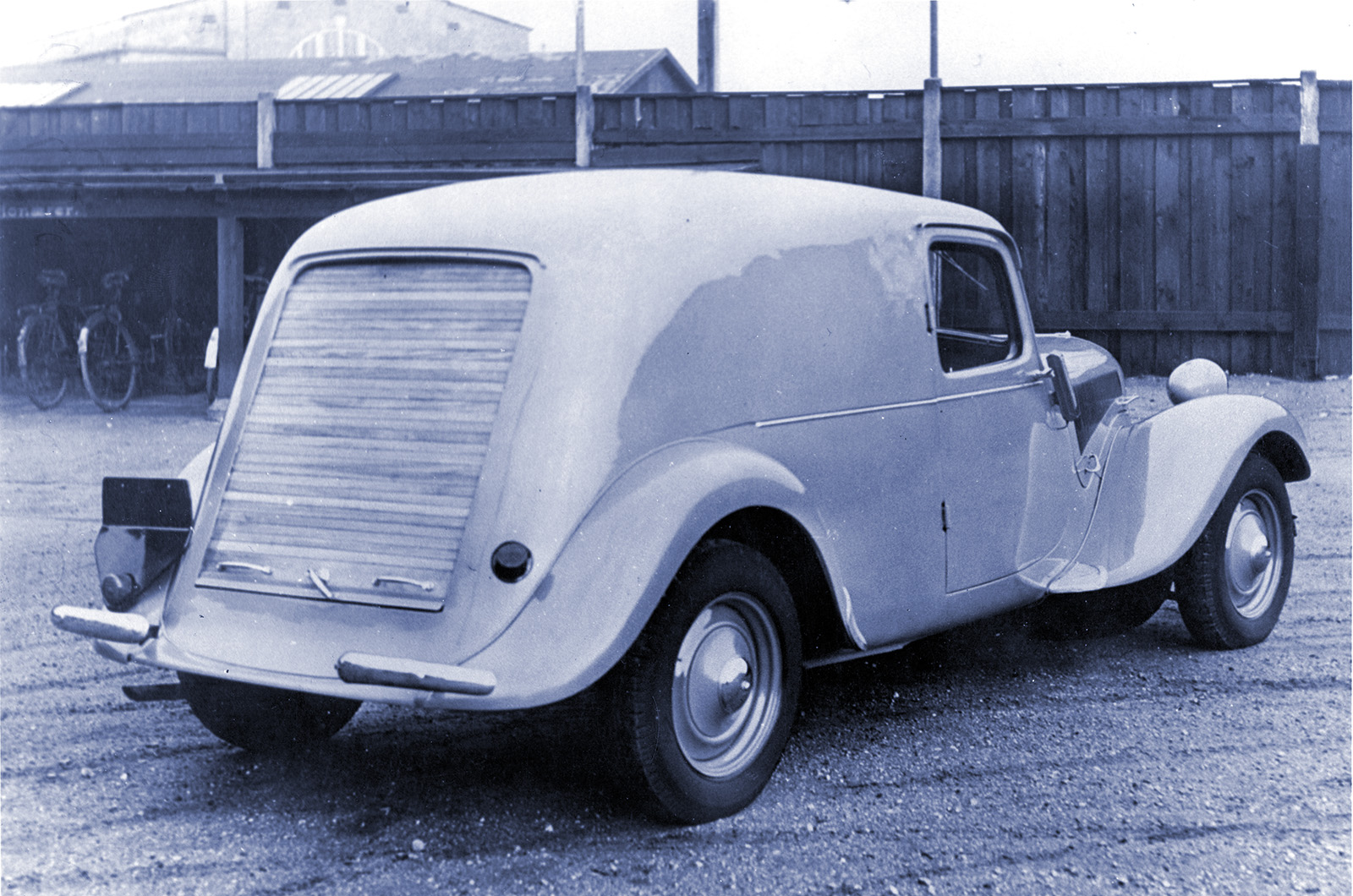
Holy crap, right? Unfortunately that cheap-but-charming wood-slat door would swell in the rain and leak or be hard to open, so finally there was a version with a side-hinged rear door:
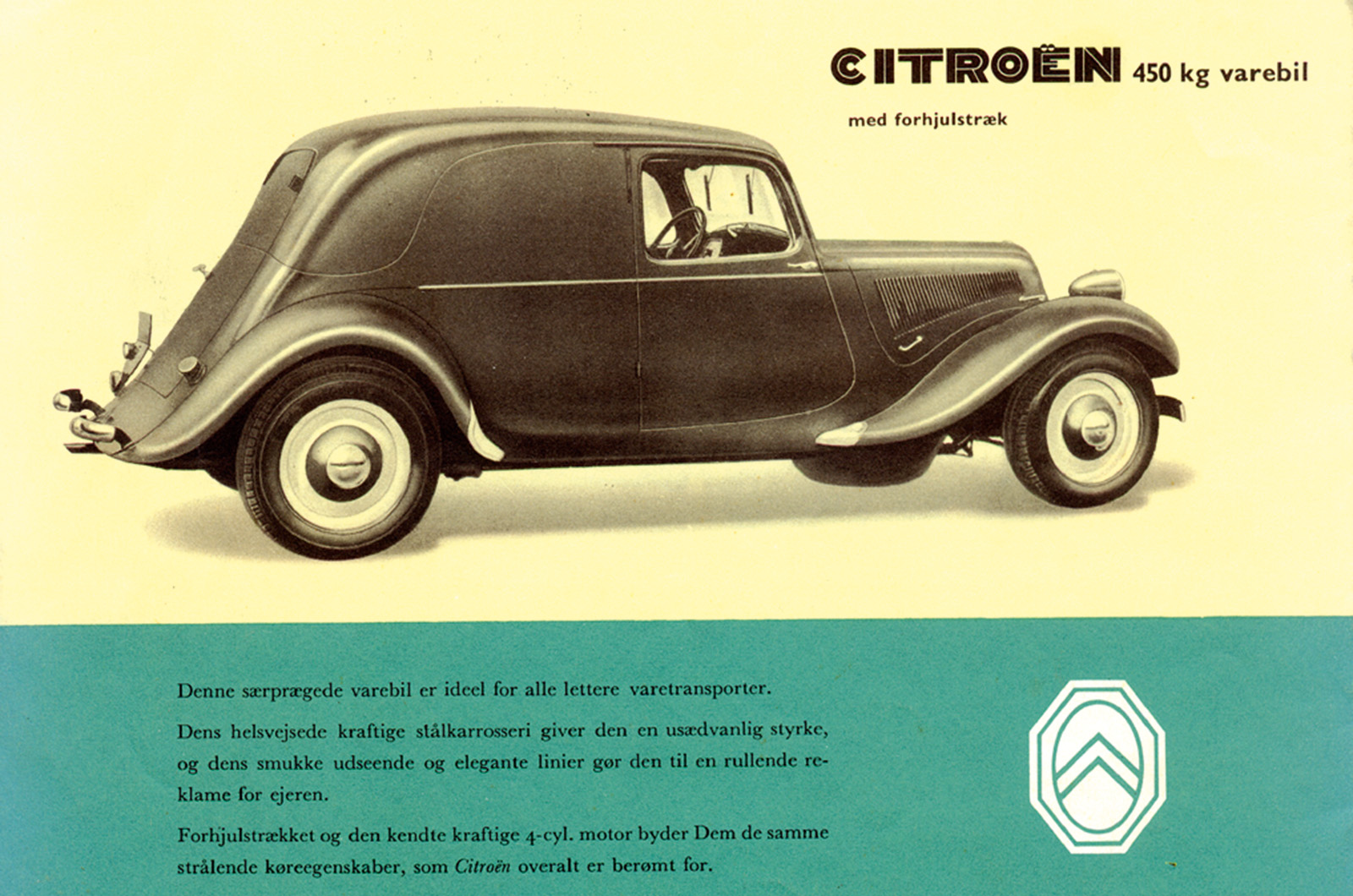
So this all means that Traction Avants had, let’s see, seven different methods of getting access to the cargo area of the car. That’s bonkers.
Okay. Now I’m going to get a little more sleep. My work here is done.

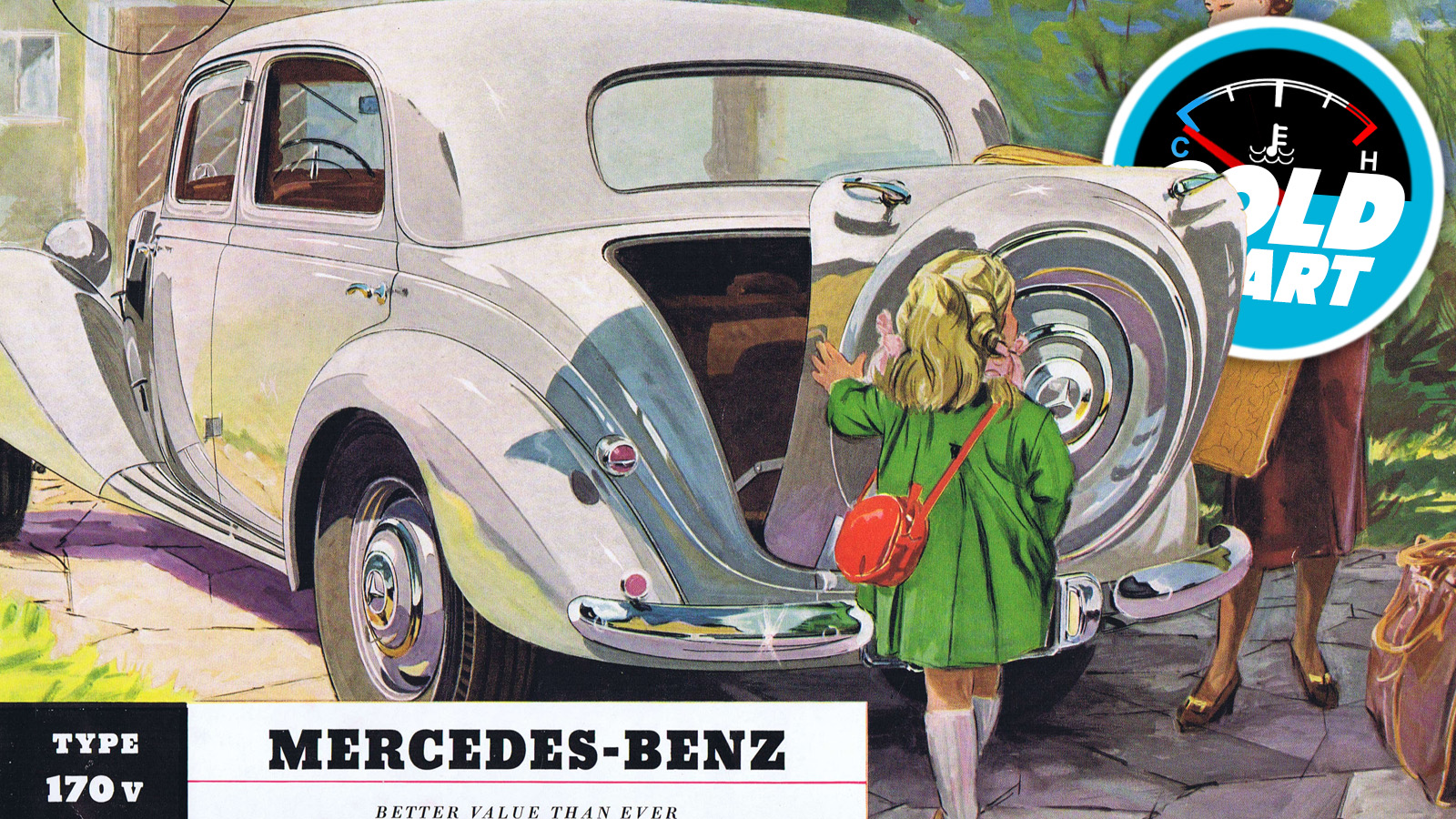







PS it is totally cool to be weird.
I’m beginning to suspect that maybe, just maybe, Jason has an odd abnormal obsession with the vehicular ass. I’ve heard rumors that this obsession starts out with a tail light fetish….then it progresses to does it have an amber turn signal Lense…then it moves onto trunk openings. Just my observation. No worries, Jason, I’m sure somewhere out there a 12 step program exist to help you with your vehicular ass obsession. In the mean time, keep these freaky articles coming weirdo!!!!! WE LOVE THEM!!!!!!!!!!!!
Won’t fit a grandfather clock? No dice
I need use heckmotor in my everyday vocabulary.
That Traction Advant Commerciale walked so that the GTI and Type R could run.
Looks like the designers of the Kaiser Vagabond came across a split-tailgate Citroen Commerciale somewhere in their travels.
It’s useful tips like “Don’t by a Citroën Traction Avant with a tambour rear door unless you don’t ever let it out in the rain” that keep me coming back to The Autopian. Thanks!
As others have commented, the drop-down trunk lid was used so that it could function as a luggage platform if there was too much stuff to close it on. This article focuses on German and French examples but the British were particularly fond of it to the point that by the time car production was interrupted by WW2 it was the normal way to get into the boot for your boots (in front of Boots’?)
After the war, the Austin A40 Somerset is a particularly weird example being a full 3-box design that forced the user to open the lid by pulling it more or less straight up and must’ve made quite an awkward extra-stuff platform. By 1959 the only remaining example was the Ford Popular, itself a lightly-warmed-over 1938 body design on a 3/4-scale Model A chassis (and probably also the last new car in the world with a fixed fabric roof insert).
Until the Mini came along just as the prewar-look Popular was going out of production…
But then the Mini itself also had the bootlid-as-platform thing going on, to such an extent that early models had a hinged numberplate so that it would still be readable with the lid open.
A brilliant feature on such a small car, the original Mini really did punch above it’s weight in so many ways.
Both of the bottom hinged examples appear to have the spare tire in the trunk lid. That would be pretty heavy to have to lift up.
Both the Merc and the Traction Avant were loved by the Gestapo. So it is probably something to do with that scissor hinge being used on fingers…
https://en.wikipedia.org/wiki/Gang_des_Tractions_Avant
Jason, have you written a book? Because I really think you should.
He has!
Robot Take the Wheel about autonomous cars.
That was ages ago, and I finished my copy twice already.
We need more Torch books.
Old cars with body on frame weren’t sturdy, so best to have the hinges close to the frame on the Mercedes – Like on almost all american pick up trucks by the way! 😉
Also, old Corvettes and SAABs – and the Karmann Ghia type 14 – had that awkward put the luggage in the back from within the cabin set up. But you knew that of course, JT 😀
I didn’t know our local CPH Citroën factory here, just down the road, made those sliding wood rear hatches (check out our silly name for them, yes a jealousy cubboard). Thanks! My vintage Citroën knowledge is most about the DS, 2CV, GS,BX and CX.
I keep trying to make “passback” stick for the body style where there’s no external opening to get to the luggage space behind the back seat, but I’m about 70 years late to that.
“Stop trying to make “Passback happen Nlpnt!” 😉
And Bugeye Sprites too.
The words “jealousy cupboard” reminded me of jalousie windows, and Wikipedia had this to say…Jalousie is the French word for “jealousy”. It originated in 18th century France from the Italian word geloso, which means “jealous” or “screen”, as in to screen something from view.
I was glad you mentioned that it only opened so far. I was worried that the heavy spare would squish that kid. Child safety was NOT a thing back then.
Children are easily replaced by unskilled labor. Though the task is more fun if you are good at it, I suppose.
tut tut, to transport the mandatory office ficus to corporate headquarters my good man.
I wonder if it might be a way to increase capacity? The trunk lid is effectively a tailgate, and you could stack stuff inside as well as in the space outside using the lid as a retainer. A few straps would prevent anything from bouncing out, and a tarp would protect it from the weather.
That’s what I thought too! Like in early Minis.
This is what I’ve read about this idea before during my days of TA ownership – it was common to overload the trunk and this bottom-hinge approach allowed that. The top-hinged ones tried to do the same thing by having a ‘bustle’ profile to increase trunk volume rather than the flush-mounted bottom hinge designs.
Seems so much more convenient to just have a fold-down luggage rack on a conventional trunk lid. In fact most of the British sports cars in the 60’s came with some kind of luggage rack to supplement the trunk space.
So what did Amphicars have, swimming trunks?
I prefer my cars with speedos.
This also needs to join COTD!
I like my cars like I like my men …
With junk in the trunk?
And a spare tire attached.
COTD here!
I’m just surprised MB was back to making civilian vehicles so quickly. Did they have a single workshop, lest factory, standing?
The Marshall Plan at work.
Get Germany back on their feet so they don’t have another generation sitting around being pissed about losing another war and potentially go full communist. I’d wager it worked-out pretty well…
Which is exactly why VW exists at all today.
A bottom hinge is far easier to implement, so it would make complete sense that it was a common configuration until enough people realized that other methods were worth paying for.
Why easier to implement? Seems like it would be the same either way.
You don’t need anything to prop it open safely.
But you still need the struts to keep it from opening too far. The same struts turned upside down can be used as props.
Struts wouldn’t necessarily be needed. Hinges with stops or just a bump-stop on the trunk could work. Also, a chain or strut that works just as a stop is less of an investment than one that needs to hold a weight up safely.
It’s been mentioned, but could this be a holdover from the rumble seat era? I’m also wondering if, since this was before the time of lift struts, a spring lift mechanism would have been too expensive/failure prone for the top hinge design. That trunk lid would have been quite heavy compared to modern rear doors, and it would have likely needed some lift assistance. Or maybe there was no lift assist and there’s your answer…
I would guess that the trunk being something of an afterthought on so many cars, they just did the simplest thing they could think of — avoiding gas struts or prop rods, and just letting gravity do the work. Impractical, but seemingly easy.
If gas struts weren’t well developed, they likely also saw the top-opening a hazard and the prop arm inconvenient to the user. And by not allowing it to fully open, it avoids the hazard of losing your luggage if you don’t latch it properly.
Side-opening would have resolved this.
There’s a solution I hadn’t considered! It would have solved the difficulty to lift/safety concern of a top-hinge while still allowing better access than a bottom hinge.
First of all, that 170H looks a heckin’ lot like a Beetle with a little extra bustle in the back.
Second, what’s with the spare in that Traction Avant with the top-hinged lid? Did you have to mount the tire as part of changing it on the side of the road? Where was the tire?
And it should be noted the H did not return after the war.
Is this too late for rumble seats?
Ahhhh, more Citroëtopian news; the way Cold Starts ought to be :-). Nice to see them getting the recognition they deserve for their many innovations.
I suspect the bottom-hinged lid was due to the weight of the tire that was mounted there, as you surmised, and also because this would also make it easier to remove said tire from the lid. Are there any examples of a bottom-hinged trunk lid that didn’t have a tire mounted on it? A cursory bounce around the interwebz didn’t reveal any to me.
BMC Mini.
It had a fold down number plate to make it legal to drive with it down and it provided a carrying surface.
Thanks. Yes that was a much more practical design.
Yes. Assuming that the tire-looking sheetmetal is actually bearing a tire, you do want that trunk lid and tire resting on the hinge, rather than hang from a hinge, which then has to be supporeted by all the sheet metal back down to the frame. Also, you dont want to have to lift all that up every time you open the trunk.
Could a top-hinged version have had it’s lift assisted by a spring setup, like later cars? yes but not only do you loose trunk opening area like in all the cars of the 60s and 70s (at least), but if you put enough spring (or gas support for that matter) to lift the deck lid plus tire, then without a tire mounted it would smack you hard the moment the latch was released. Also, it would be impossible to mount the tire to the underside top-suspended lid. Or at least an olympic sport.